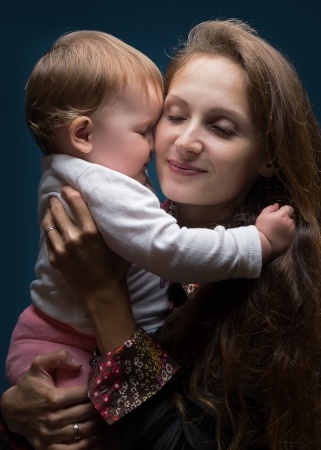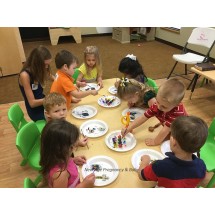
We do know that children develop at their own unique pace especially in their speech and language development. Some children might still be babbling while others of their age are already communicating in words. But certainly, there are also some ways in which, you can help your child build up their language skills. Here are some strategies to build on your child’s communication skills!
1. Wait for your toddler to respond.
 If you ask your toddler a question, wait for them to respond instead of throwing more questions at them (“Is this what you want? How about this? Or this?”). If you’re constantly guessing and anticipating what they want, they won’t feel the need to tell you themselves.
If you ask your toddler a question, wait for them to respond instead of throwing more questions at them (“Is this what you want? How about this? Or this?”). If you’re constantly guessing and anticipating what they want, they won’t feel the need to tell you themselves.
It’s easy to respond for our little ones, and this rings true when other people ask them questions. Let’s say a well-meaning neighbor asks your kid, “How are you?” or “What are you doing?” Without even noticing it, you might answer for your kid, “Oh, she’s a little tired today,” or “We’re taking a walk now.” Give your child a chance to speak up.
2. Use a mirror.
Even if your toddler learns new vocabulary at an astonishing rate, she might need some help with pronouncing them clearly. Have her practice and build those little mouth muscles by singing and reciting nursery rhymes together in front of the mirror. You can even give her a small hand held mirror as a fun prop so that she can see her own mouth move as she speaks.
3. Play the phone game.
A toy telephone is another useful prop to encourage your toddler’s speech development. Don’t have a toy telephone? No problem – use a block or even a toilet paper roll. (Remember that toddlers are imaginative masters who constantly reinvent every day objects!) Start by pretending to talk to Aunt Jane or Grandma. Be animated and sound cheerful. Then, once you have your toddler’s attention,  pass the “phone” to her and ask if she wants to talk, too. She’ll imitate you and start gabbing away!
pass the “phone” to her and ask if she wants to talk, too. She’ll imitate you and start gabbing away!
4. Repeat new words in different ways.
Children need to hear new words and phrases frequently before they can commit them to memory. Actually, this isn’t only true for kids – it applies to everyone. When you learn a new word, you probably have to use it in several conversations before it becomes permanently ingrained in your vocabulary. Likewise, when you talk to your toddler, use a new word in different sentences and contexts such as, “Your gold star sticker is shiny” and “I cleaned your shoes today. Look how shiny they are!”
5. Build on short sentences.
If your toddler points and says, “Bird,” don’t just nod. Add, “Yes, it’s a small bird,” or “Yes, the bird is flying!” Don’t stop at simply labeling things. Keep the conversation going by asking questions (“What’s the bird doing?”) or describe the object’s colour, size, texture, smell, action, etc. This is a natural way to expand your child’s vocabulary.
6. Narrate.
Narrate what you do. For example, before you take your kid outside, say, “I’m going to put you in your stroller. Now I’m putting on my shoes.” When giving them a bath, say, “I’m putting soap on the wash towel. Can you lift your head? Good. Now I can wash your neck.” Not only does narrating build a sense of security by letting toddlers know what’s going on, but it also exposes them to names of
familiar objects and actions in their daily routines.
7. Read.
Reading to your child is, without a doubt, one of the most effective ways to encourage their speech. It also plants the seed for strong literacy skills. True, at times it may be tempting to let them watch cartoons instead, especially when it spares you some time to do your own things, but the parental participation in reading is priceless. All kids love being read to. Call out and point at specific objects in the illustrations. Invite your little one to turn the pages. They’ll learn words faster by connecting them with pictures in the story.
8. Don’t use baby words.
It’s almost impossible not to talk to little kids in our “baby voices” – softer and more high-pitched. But be careful not to use baby words as well. For example: “Are you Dada’s witto pwincess?” or “Want to eat din-din or drink some wa-wa?” Pronounce properly. Don’t dumb down words. When children first learn to talk, they often blabber or start with baby talk because they’re unable to pronounce the full words. That’s fine for them, but parents shouldn’t respond with baby talk as well. Use correct words so that your little one will learn.
9. Talk more!
Put away the electronics. Tuck your hand phone away. Stop staring at a screen and look into your toddler’s eyes instead. Talk to them, even if they don’t always respond. The important thing is engaging them in the spoken language. Do that, and you’ll have a little talker
on your hands in no time!
By Jenny Tai






